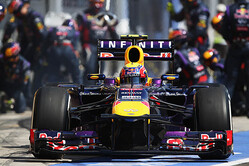


11/01/2014
NEWS STORY
 In the wake of an incident during the German Grand Prix, FIA Race Director Charlie Whiting says he is against the idea of introducing a minimum time for pit stops.
In the wake of an incident during the German Grand Prix, FIA Race Director Charlie Whiting says he is against the idea of introducing a minimum time for pit stops.
With the world championship title rapidly disappearing in to the distance, a couple of teams in 2013, as in previous seasons, took comfort in the fact that at least they were quickest when it came to pit stops - though Red Bull walked with that honour also when it serviced Mark Webber in 1.9s in Austin.
However, in the wake of a number of incidents, most notably in Germany when a loose wheel from Webber's car struck an FOM cameraman, some have wondered whether the stops are being rushed at the expense of safety.
Consequently, some have suggested that rather than seeing the pit crew racing against the clock as they turn around their drivers, the rules should mandate a minimum time for pit stops to ensure that everything has been done correctly and that the car is truly 'safe to go'. After all, how many times have we seen cars grind to a halt at the end of the pitlane, or back on track, the driver haplessly watching a wheel or wheelnut overtake him.
Speaking in Birmingham however, Whiting says he is against the idea of introducing a minimum time for stops.
"It's been discussed but it's not something that's likely to happen, definitely not," he said. "I think that would be a bad move and I don't think it would achieve anything.
"I think the incident with Mark Webber's wheel in the Nurburgring started quite a lot of discussion," he continued. "It's all driven by the quest for speed, but I don't think if you had a mandatory minimum pit stop time it would change anything. They would still change the wheels quickly and you'd have the rather odd sight of a car just sitting there for the rest of the time.
"I think what we have to address is the fundamental problem," he admitted, "and that is 'why did that wheel not get fixed on properly?' That's really what we want to do. And 'why was the car released in an unsafe condition?' So what we've done since then is to introduce mandatory two stage wheel retention devices on the wheel nuts.
"We have made it compulsory to have the button on the gun be in a position where the operator has to make a distinct move to say 'yes I'm done', where before they could just slide their thumb across and just say 'I'm done'.
"Each gun has a button which the operator presses to say he's done so then the jack men get two green lights on the end of the car, drop the car, then the guy releasing the car sees two green jacks. We've also introduced an override on the pit wall which is saying that nothing can happen until he takes his finger off the button as well."
Whiting also addressed the issue of the safety of marshals, citing the death of Mark Robinson who fell under the wheels of a mobile crane whilst recovering the stricken Sauber of Esteban Gutierrez during the final stages of the Canadian Grand Prix.
The accident was dreadfully unfortunate," said Whiting. "However, things will change in that respect. Since that accident, we have briefed everyone, if you are using one of those JCB-like vehicles to lift a car you should never walk in front of it.
"It kind of stands to reason," he added. "The Brazilian ASN has a system which will attach two ropes to the car to hold it level and stops it twisting so you don't need people to stabilise it. We are trying to make everyone aware of this sort of system in order to minimise the amount of people needed to recover a car. That is the key to it."
However, Canada was singled out, Whiting also pointed to the race in Korea where marshals were seen running about in front of a moving crane.
"When you look at Korea, when they recovered Mark Webber's car you can see the tractor coming and there are four marshals in front of it," he said. "And they are running, which is ridiculous really."